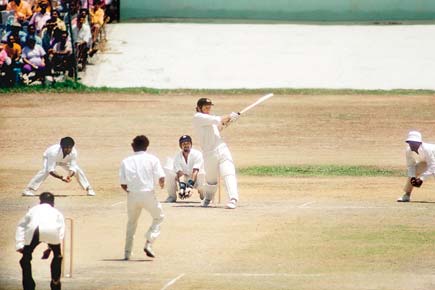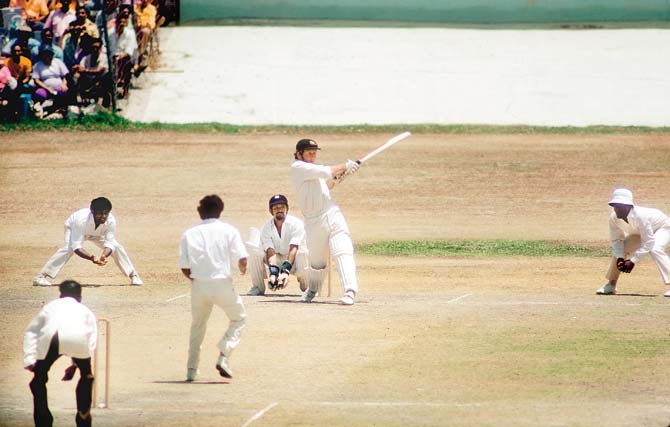Correct and decisive footwork has to be learned from an early age so it's ingrained by the late teens and the confidence is built to utilise these skills under any conditions, writes Ian Chappell

The author, who was then captain of Australia, pulls West Indies spinner Inshan Ali during the Trinidad Test at Port-of-Spain in 1973. Pic/Getty Images
Sydney: Australia was whitewashed by Sri Lanka and in the process surrendered the number one Test ranking. That may be just the beginning of their nightmare, with a challenging 2017 tour of India hanging over the players' heads like a hangman's noose.
ADVERTISEMENT

The author, who was then captain of Australia, pulls West Indies spinner Inshan Ali during the Trinidad Test at Port-of-Spain in 1973. Pic/Getty Images
It's been suggested Australia is doing everything possible to address an on-going weakness in spin friendly conditions. Pitches are specifically prepared at the National Academy to replicate spinning conditions and more youth tours are undertaken to Asian countries. Both good ideas but they don't begin to address the underlying problem.
Learning to play spin bowling is not something you do in your twenties. Correct and decisive footwork has to be learned from an early age so it's ingrained by the late teens and the confidence is built to utilise these skills under any conditions.
By the time I'd reached 10 years of age I was given some important advice by my old coach Lynn Fuller. He told me; "Ian, it doesn't matter how good I am as a coach I can't help you when you're out in the middle. The quicker you learn this game for yourself the better off
you'll be."
More specifically on playing spin bowling he advised; "Better to be stumped by three yards than three inches. Don't think about the wicket-keeper when you leave your crease otherwise you're thinking about missing the ball."
I saw Australian players in Sri Lanka stumped by three millimetres. An adventurous advance drastically changes the length of a delivery in favour of the batsman; a tentative, minimal move forward only improves the bowler's chance of success. A good player of spin alters the bowler's length to his desire and by doing so, he can manipulate the field placings.
By achieving these objectives and putting the loose ball away, a good spinner can be frustrated. A slogged six or a reverse sweep doesn't unnerve a good spinner; the maximum hit means he's still bowling to the same batsman.
What drives a spinner crazy is strikers constantly changing, with the batsmen using quick, decisive footwork to maneuver the ball into gaps and take singles. Once the spinner is tearing his hair out, then the loose deliveries come and that's when a batsman has to pick off the boundaries.
The young Sri Lankan batsman Kaushal Silva, did this to perfection in the second innings in Colombo. To achieve this in a long innings under difficult conditions is exacting; by the end of a marathon innings a batsman should be knackered both physically and mentally. One of the great challenges of playing good spinners in difficult conditions, is the batsman pitting his brain against that of the bowler.
This is not easy to achieve but it's impossible if you haven't learned good footwork at a young age. If you have the confidence that is only provided by a solid foundation, you won't be panicked into playing low percentage shots. And with a clear mind provided by that confidence, there's a realisation there are actually some advantages for the batsman when the ball is spinning sharply. The bowler has to pitch further outside the stumps to hit them and with the ball coming at a sharper angle, it affords the batsman an opportunity to work it into a gap.
A coach hurriedly preparing a young player for a lucrative T20 contract is incompatible with the education required for a successful Test career. However, a young batsman who is given a complete grounding can then capably handle any form of cricket.
Batsmen must have a plan, especially when facing good spinners but it must be personally devised, not one prepared by a coach. Some of the Australian plans in Sri Lanka were based purely on survival. If a plan doesn't revolve around scoring runs in a reasonably secure manner, then it might as well be a map of the London tube system.
Learning to play good spinners in conditions that suit them is not a forty minute lesson, it's a complete education, University included. If Australia don't already have batsmen skilled in the art, then chances are the Test tour of India will only add to their Asian nightmare.
 Subscribe today by clicking the link and stay updated with the latest news!" Click here!
Subscribe today by clicking the link and stay updated with the latest news!" Click here!







